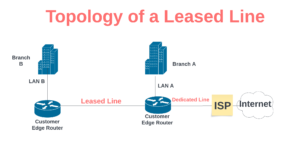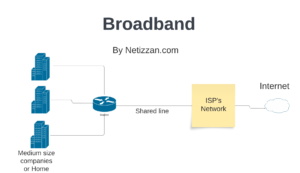Leased line and Broadband are two important terms used to describe the types of service packages provided by an internet service provider.
A leased line is a dedicated and fixed point-to-point connection that links two geographically separated sites, each equipped with their own Local Area Network (LAN).
Leased lines are often confused with Dedicated internet. Though both of them are closely related, the key distinction lies in their purpose.

We had published a post that explains the difference between Leased Line and Dedicated Line. We encourage to check it out.
Because of the inherent similarity between a leased line and a dedicated line, we will be using the term “leased line” interchangeably with “dedicated line” throughout the rest of this post.
A broadband line, on the other hand, is an internet service package that uses a shared internet line to provide connectivity to to the customer.

Let’s now go through how leased line differ from broadband line in different scenario.
Leased line Vs. Broadband: 13 Key differences
Here are some of the ways that Leased lines differ from Broadband internet:
- A leased line is an internet connection used in Dedicated internet service to extend the WAN
of an organization from their headquarters to other branches, while a broadband line is a shared internet line used to connect customers to the ISP’s network.
- A leased line offers a symmetric connection, while a broadband connection offers an asymmetric connection. This means that the upload speed and download speed are the same on a leased line but not on a broadband internet connection.
- Broadband is a suitable internet service option for home and small-sized company, while leased lines are used to provide internet service to large-sized (enterprise) customers.
- Application: Leased lines is an internet option for data-intensive applications like online video games and video conference meetings, while broadband internet is an internet service option suitable for less data-intensive applications.
- Bandwidth Size: Leased lines generally offer a higher bandwidth size than broadband internet.
- Speed: Because leased lines offer higher bandwidth, they offer higher internet service speeds than broadband services.
- Cost: Leased line (dedicated internet) service is generally more expensive than broadband internet service because of the higher bandwidth and more infrastructure needed for dedicated internet service.
- Service level agreement: Dedicated internet service offers guaranteed uptime, response time, and other service level agreements that may not be available for broadband service.
- A leased line (dedicated internet service) has its own dedicated VLAN, while different broadband customers share the same VLAN.
- Security: Because leased lines have a dedicated VLAN, network traffic is generally more secure on leased lines than on broadband lines. Broadband line generally experience traffic congestion.
- Usage: Leased lines are Suitable for critical and diverse applications, including data transfer, cloud services, and mission-critical operations. Broadband internet, on the other hand, is best suited for standard internet services like web browsing, email, and video streaming.
- Scalability: A leased line connection (dedicated internet service) is generally more scalable than broadband internet service.
- Latency: Broadband lines generally have higher latency than leased lines because of the traffic congestion that usually occurs.
FAQ on Leased line Vs. Broadband
Here are some frequently asked questions on leased line Vs Broadband internet;
What is the maximum transfer speed for Leased line?
Some leased line providers can offer internet speed in the range of 10 Gbps for businesses with huge data demands. The particular internet speed depends on service provider.
What is the maximum transfer speed for broadband?
The internet speed of a broadband service is usually in the range of 1Mps to 1Gps. This speed can vary depending on the specific internet service provider.
Which connection offers symmetrical upload and download speeds?
Leased line offers symmetrical upload and download speeds.
What is the main difference between a leased line & broadband internet?
The main difference is that a leased line provides a dedicated, exclusive, and fixed point-to-point connection, while broadband internet is a shared service serving multiple users in an area.
Which business type needs a leased line?
Businesses with critical operations, high data demands, and a need for guaranteed performance often require a leased line.
Which types of businesses need broadband?
Small and medium-sized businesses, as well as residential users, are best suited for Broadband internet because of its affordability and suitability for regular online activities.
Conclusion
From what we have covered, Leased lines provide high-speed internet services and often come with a high Service level agreement. It is suitable for enterprise businesses that use data-intensive applications and need 24-hour connectivity to run their businesses.
Broadband, on the other hand, is for small to medium-sized businesses whose internet speed requirements may not be large. Broadband internet is also commonly used in residential buildings for home connectivity.

I am a passionate Networking Associate specializing in Telecommunications.
With a degree in Electronic engineering, I possess a strong understanding of electronic systems and the intricacies of telecommunications networks. I gained practical experience and valuable insights working for a prominent telecommunications company.
Additionally, I hold certifications in networking, which have solidified my expertise in network architecture, protocols, and optimization.
Through my writing skills, I aim to provide accurate and valuable knowledge in the networking field.
Connect with me on social media using the links below for more insights.
You can contact me using [email protected] or connect with me using any of the social media account linked below



